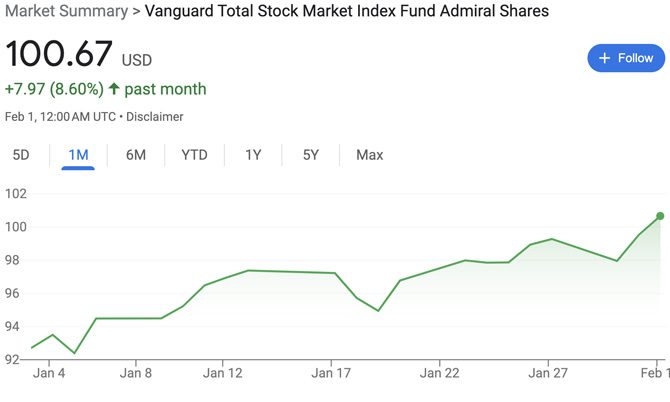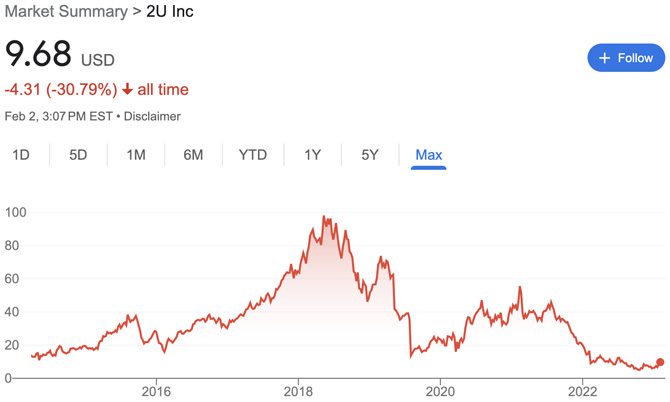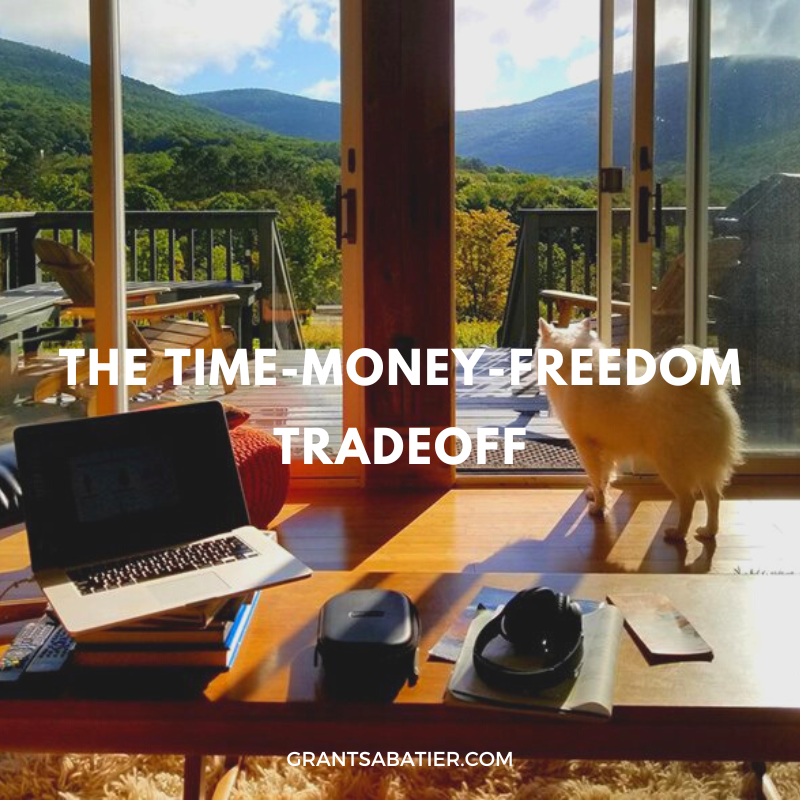As I write this week’s newsletter, the US stock markets are closing out a strong week after being up over 8.5% this year.

January trading was characterized by rapid fluctuations caused by tens of thousands of tech-job layoffs, mixed corporate earnings reports, and predictions about a rate-hike reversal by the Federal Reserve.
Meanwhile, forecasters are still anticipating the economy to slide into a recession at some point this year. But, as you know, no one knows what will happen.
With all this uncertainty, what’s the best place to invest your money in 2023?
As I mentioned in an earlier post, uncertainty breeds opportunity. I still believe it’s a great time to invest in these asset classes: stocks, real estate, and businesses.
Here’s why:
1. Stocks are the foundation of a solid investing strategy
Your best bet is still–and will likely continue to be–a low-cost total stock-market index fund like VTSAX or FSKAX. 80% of my net worth is in VTSAX.
When you look at historical performance across asset classes, the stock market continues to be the best investment to grow wealth consistently over the long term.
While many firms have said in recent years, including Vanguard Founder Jack Bogle, believe that index fund returns over the next 10-20 years will be less than the last 10-20 years, I’m bullish on a growing American economy and our hyperfocus on innovation.
While I’ve bought and sold individual stocks in the past, now it’s just a waste of my time and energy to try and beat the market. I’d rather be doing other things.
I beat the market for seven years straight in my personal investments because I invested in Amazon and Facebook at the right time.
I’ve also made bad bets when I’ve had a huge edge in a sector. Before I launched Millennial Money, I ran a marketing agency that specialized in generating leads for MBA programs.
I spent years working in higher education. I knew the needs of the sector inside and out. I stayed current on the latest trends and talked to my clients multiple times daily.
So when I started hearing about this new startup called 2U that was partnering with Universities on a revenue share basis to create and manage their online education programs, I was convinced it would be hugely profitable.
I had high-quality information about this company and market. My clients worked with 2U. I had access to 2U contracts. I saw the potential in this sector and the technology 2U provided, so I invested in the company in 2016.
I held on to the ride up in 2018, but then the stock got crushed, and I ended up selling at a loss. I should have taken my gains out of the market, but I didn’t see the increasing pressure on the business. Even though I was working adjacent to the company, there is no way I could have seen the Universities that weren’t renewing their contracts and other challenges.

Sometimes you get lucky. Sometimes you can have an edge. However, these don’t guarantee you’ll make money on the stock market. There are too many variables outside your control.
Even if you love stock picking, the effort is highly unlikely to pay off or be worth the stress.
The line between investing and gambling today is very fine. You can place high bets on high-risk opportunities, but they will always be just that—bets.
Professional investors have access to the best, most up-to-date market information, and most don’t beat the market. They are constantly watching every sector and searching for the edge that will give them an advantage.
Even then, only a few will end up beating the market, and those that do are essentially playing a numbers game – not a business value game.
In the end, who wins and who loses in this game comes down to luck. Even the best investors can only be lucky some of the time.
Last year I read The Man Who Solved the Market, a book about Jim Simons, the man who effectively invented quantum investing. Before he started his hedge fund, Renaissance Technologies, Simons was an MIT-educated mathematician and CIA codebreaker.
He made $22 billion through his proprietary algorithm and out-invested seasoned investors like Warren Buffett and George Soros. Simons made billions of dollars for himself, his team, and his clients, but he needed to invent a brand-new type of investing to do it.
He also needed to use an algorithm to exploit inefficiencies in the market. Technology can spot and manage these inefficiencies, but people rarely can.
If you have an extra dollar to invest in 2023, invest in the full stock market using a low-cost, passively traded index fund like VTSAX or something similar. The low fee and broad diversification build in an opportunity to make money across the market, without having to time anything.
As my net worth grows, I continue to invest in an index fund and will continue to do so for years to come.
To learn more about index fund investing and simple investing strategies, check out Chapter 10 “The Seven Step Fast-Track Investment Strategy,” in my book, and also one of my favorite books on investing: The Bogleheads’ Guide to Investing.
2. Real estate is more work than I expected, but it’s still a great investment
I’ve been investing in real estate since 2016 and have made over $125,000 in profit on selling one of my units, all while my net worth (assets-liabilities) has grown by over $850,000 because of the growth in value of my real estate portfolio. Currently, 10% of my net worth is invested in real estate, but I’m looking to increase that percentage to 20% over the coming years.
With deductions, I keep my taxable income from real estate as low as possible and ideally zero or below zero. I’m not a cash flow investor – meaning I’m not interested in getting consistent cash from my rental properties.
I’m investing for long-term appreciation, so I expect the properties’ value to grow over time until I sell them.
My anticipated holding period is 20 years, but it could be even longer. I want the rental income to cover the mortgage and property repairs each year. Any money I make beyond that, I invest back into the properties to improve them.
I invest in real estate to diversify my portfolio and want to acquire properties in my neighborhood that are easy to manage. This significantly minimizes the complexity of investing in this asset class for me.
While I now only have single-family homes, I can easily manage them by being proactive about repairs. When I buy the homes, I invest the money up-front to ensure everything works well and build this into my long-term expected return calculation.
I’m getting an excellent return for something that I do very passively. However, I’ve been exploring adding student housing, multi-family units, and commercial property to my portfolio.
But, so far, expanding my real estate holdings into other types of properties feels like it would be a lot more work than I want to take on. I don’t want to build a real estate business right now, which is what you need to manage a medium to large portfolio of properties efficiently. But I might be more interested in the future. For now, I’m sticking with picking up 1-2 single-family properties each year when I find ones that meet my investment criteria.
There are so many different real estate strategies that you can personalize to fit your desired investment goals and fit into your life. I remain bullish on real estate as a long term investment, and it should be a part of any investment portfolio as both a means of diversification and a hedge against future uncertainty.
No matter where you are investing or plan to invest in real estate, check out the future impact climate change is expected to have on your market and holdings. Here’s a solid post from McKinsey on how you can build climate change models into your real estate portfolio expectations.
While there are many climate models and tools out there, Climate Checker is a new free one that I like to use.
A great book to read to learn more about different real estate investing strategies is How To Invest In Real Estate.
3. Businesses allow you to control your income and build resilience into your life
Now is a perfect time to start considering whether to start or buy an existing business to expand your portfolio.
Approximately 10% of my net worth is invested in my own and other private businesses. Since I’m working to keep my taxable income low, I am always looking for ways to reinvest in my companies to help them grow.
One of the things that I love about owning my own business is that I can monetize my expertise and control how the business operates. Instead of buying shares in a publicly traded company and becoming an “owner” of a business managed by someone else, I can control the business myself.
I also get the added benefit of working with cool people, creating new things, and adding value to the world. These are all fulfilling beyond the money and add a lot to my life.
We’re at the beginning of a massive wealth transfer (uncomfortably referred to as the silver tsunami) in which Baby-Boomer entrepreneurs hoping to retire are looking to sell their companies. There already are a lot of businesses for sale and there will be tons more.
Not only that, many of these businesses offer some form of seller financing. You can also get SBA loans to buy some companies, so you can buy them for a lot less money down than you might think. There are many, many deals to be found and new industries to be explored.
Check out this recent Twitter thread where Mitchell Sorkin goes into great detail about how he’s growing his ATM business. It’s such a crazy time to be alive that people are sharing the ins-and-outs of building their businesses in public for others to learn.
I could write about this forever, but this newsletter is getting long, and I have to get back to writing my book!
Building a business is one of the best things you can do to grow wealth and build resilience, but it’s a lot more effort than passive index investing, so consider the time-money tradeoff.
To learn more about buying a business, check out the HBR Guide to Buying A Small Business (this book is an easy read and very good).
Now is a great time to invest in stocks, real estate, and individual businesses. I encourage you to take advantage of the many opportunities available to make money right now and know your limits, so you don’t add unnecessary stress to your life.
Time is always more valuable than money.
This post originally appeared in my Millennial Money newsletter, which you can sign up for here.
Grant Sabatier writes about money, mindfulness, and financial independence – all with the ultimate goal of helping you build a life you love.
His story and ideas have been featured in The New York Times, Washington Post, NPR, CNBC, Business Insider, and many other places.




